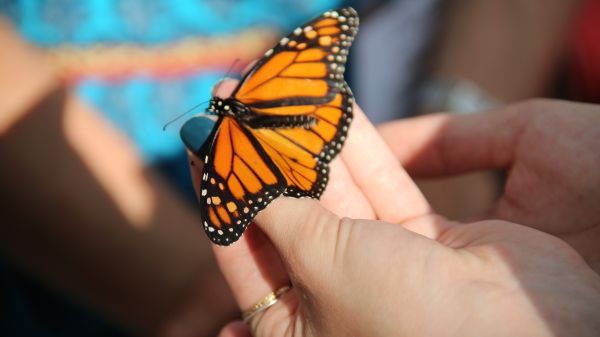Is Any EE Better Than Nothing? A musing from a grandfather

Is Any EE Better Than Nothing? A musing from a grandfather
by
Joseph A Baust
The adage I have heard is that something is better than nothing. Like the song lyric goes, “With a little bit of luck…with a little bit of luck…with a little bit of bloomin’ luck.” This philosophy came to mind during a recent visit to see one of our grandchildren. The notion in environmental education sometimes may be, with a little bit of EE is all you got.
Recently my grandson and I went to a park, along side of a river. The Nature Center had a program for young children; all but a few were two years old. It was led by two nice interpretive people who had developed a program for the children that started inside, went outside, returned to the inside classroom for discussion.
What I noticed initially was the children were asked to explore the various opportunities inside the classroom; many of the items required small motor skills. Though my thought was, it was too soon to have fine motor activities for 2 year olds, but at least these young children were asked to explore. Thus having some free play was praiseworthy.
As we reached a more formal part of the lesson, we began to depart from age-appropriate activity and focused more on a “set” lesson that included terminology that was foreign to these children. I began to notice they wanted the children quiet, in a circle, and listening and watching instead of exploring and touching.
As that part of the program wound down, we went out to a natural area, along side the river. There were a series of log benches, each about 12-14 feet long, many of which were being used by the public to watch the river and the boats. Our leaders had a microphone, which was a nice touch because it was a noisy place for the lesson with the river, the boats, and the public all enjoying the site.
It was a beautiful day; the sun shining, a nice breeze and the children were spread out on two of the benches. They were asked to come in close and with the help of the parents and nannies we had modest success; they were jostled into a small circle where the program began. The beginning question was, do they know how to play Bingo? Of course no one in the group knew the game, much less how to put three consecutive items in a row to win the game. Not only did these two-year-olds not know the game, but also the spatial skills needed to play the game were clearly not there. They were then told to collect small pebbles from around the area for the game. The two-year-old children participants of course could find pebbles, sometimes rocks and if they could they would have brought back boulders. From that time on, I observed chaos because as the leaders tried to draw back the children into the small group setting, they were still looking for rocks, throwing the rocks…and exploring. But what could be better? They were doing what two year olds do, explore.
We began the lesson with telling the two year olds how to use their pebbles to play Bingo. Then they were asked questions about the river environment. Words like protective coloration or camouflage was used in addition to other words that children much older would probably not be able to understand. They were asked to identify items and they were given pictures to place on a felt board. They did this one child at a time after they had participated in some way. Chaotic it was, but the leaders somehow held it together or perhaps the parents and nannies supplied the necessary assistance.
Somehow someone won the Bingo game, no doubt because a nannie or parent had helped the child. But it was clear these children did not care about winning or Bingo. It appeared to me the children wanted to explore and they were herded into a formal lesson where the lesson itself was more important than the children.
We went back into the building for a story and to touch a fish that most of these two year olds would not even get close. A goodbye song was sung with a melody the children did not know and with a cute set of words that intersected the lesson, but it is doubtful they picked up on this at all.
The children were ready to leave and the two leaders clearly were ready to end the lesson. It was a lesson in watching the futility of a plan to learn about nature that really taught how little fun nature had in store for them. It was formal, formal, formal for children who were needing informal, informal, informal.
As I left the facility with my grandson, I asked the question to myself, was this experience better than no experience at all? My first answer was it is great to have children experience nature. They need it, they love it, and they were there.
My second answer was maybe this experience was not worth it at all. In fact maybe these children had been taught that nature was something formal, where you had to know Bingo before you could play, you had to sit and listen when there were so many things to explore, BUT, you couldn’t. Though I know their ability to make this inference formally was also not age appropriate.
I also tried to explore the economics of it. This activity was a paid one, so I could not say it was free and therefore, what you get for free sometimes is not worth it. But this was one lesson in a series for these specific children.
I observed two young leaders who obviously knew biology, environmental science, but did not know how to make a lesson for two year olds age appropriate. At some point I thought maybe the lesson was “canned” and they got through it because it was something they had to do and finish, no matter what children they had or were coming to the nature center. But, that is a rather unkind thing to think; yet it went through my mind.
Was it a function of leaders wanting to be “leaders” and have the attention of all of the children? Was it the way they had been taught? Was the information they attempted to teach usurp the need to make a connection to these young children?
So I return to my initial question. Was this experience better than no experience at all? With a little bit, a little bit of nature better than nothing, no nature at all? The more I thought about this, the more questions I asked myself. Maybe, just maybe one child out of that group of 12 or so young children gained something from just being there. Perhaps it was not.
The conflict this experience brought to my mind continued on until I had to write what happened two months later. Processing this to me was painful. First I did not want to defame the two leaders, they clearly had a lesson and were prepared. But they were prepared for what? They were not prepared for these two year olds, their levels, their ability to work in a group, and to grasp the biological concepts. The question I posed however was not about the leaders as much as the children. Did those children gain something they would not have without that experience? If they did, what did they learn? Was it a positive experience about nature, in nature, or one that may have been off putting?
This might lead me to make the point, maybe if these leaders had been trained in working with young children, with the NAAEE Standards, the NAEYC Standards and practices, with how to provide age appropriate experiences for young children, maybe the gains would be better.
The last sentence hit me! “The gains would have been better,” which infers something was garnered by these children. If so, then their experience was better than nothing. Yet somewhere back in my mind I wonder if the impact of that lesson, paid for by the parents did anything to invite children to explore nature. After the experience I can say my two-year-old grandson, if he could have articulated what he had learned, might have said he liked finding the pebbles best. Of course his post-script would have been he liked throwing those pebbles even better.

Comments
Lovely musings, Joe. I imagine you DID ask your grandson what he got out of the adventure, what he liked, and what he remembered. What did he say?
I recall a preschool teacher telling me that the best thing about last year's field trip was that I asked the kids to lay down on the boardwalk and look into the water. It took a minute or two for them to focus, but they all eventually saw caddisflies climbing in and out of their stick/weed homes. So exciting!